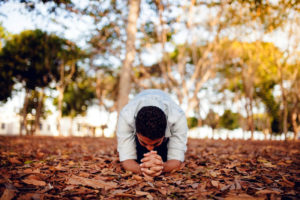The 2000 movie “The Legend of Bagger Vance” is one of my favorite motivational films. I was recently talking to someone and speaking highly of the movie when they made the comment, “Well, I’m just not into golf.” I chuckled and said, “Then you may like it because it’s not about golf.”
If you’ve seen “The Legend of Bagger Vance,” you know it’s about life – particularly the low places we all find ourselves in from time to time. Matt Damon plays a man named Rannulph Junuh who has lost his sense of purpose after a traumatizing experience during World War I. Junuh tries to isolate himself from anything and anyone that reminds him of his past, including the game of golf.
Though he has given up on himself, not everyone has given up on him. He is asked to play in a golf tournament to generate local interest and, at first, uses sarcastic wit to brush off the request. But something is stirred by the request: a distant memory of his passion for golf. One night while half-heartedly hitting golf balls into a field, a stranger emerges from the darkness. This stranger takes on the challenge of helping Junuh “find his swing.” It is a process that transforms Junuh as a person and, in the process, makes him a better golfer.
The Valley of Faith
 Sometimes we can have an issue in a particular area such as our family or a relationship that can affect all areas of our life. Until we find a resolution we feel stuck. I refer to these times as valleys as opposed to mountain tops.
Sometimes we can have an issue in a particular area such as our family or a relationship that can affect all areas of our life. Until we find a resolution we feel stuck. I refer to these times as valleys as opposed to mountain tops.
Most of us feel like life would be perfect if we could avoid the valleys and stay on the mountain tops. I once heard a man say in church, “I met God on the way up, but I got to know Him on the way down.” That statement played over and over again in my mind.
God is Nigh in the Valley of Faith
The valleys need not be feared or dreaded. Rather these can be the times when we find ourselves closest to God. Psalm 91:1 offers us comfort that “He who dwells in the shelter of the Most High will rest in the shadow of the Almighty.”
In the movie, Junuh listens to what his mysterious new friend has to say at first. When his golf game begins to improve dramatically, he believes he no longer needs help. During the tournament, his game becomes sloppy. However his arrogance prevents him from asking his friend for advice, and his friend is not eager to rescue him. Junuh completely loses focus. Literally hitting his ball off course and into a wooded area, he finds himself again in the shadows. His mind begins swirling out of control. Before he completely loses hope, his friend is near him, talking him through his emotions, clarifying reality versus illusion and reassuring him of a good outcome.
Jeremiah 29:11 (NIV) says, “For I know the plans I have for you,’ declares the LORD, ‘plans to prosper you and not to harm you, plans to give you hope and a future.” God loves us so much that He allows us to end up in valleys. Sometimes we end up there because of our own doing. Other times life takes us in an unexpected direction through no fault of our own. Regardless of the reason, we have two choices: We can give up or have faith.
Valleys are where we are humbled. There, we can cling to Him and we can be transformed, emerging from the shadows stronger than before.
If you find yourself in a low time in a relationship, school experience, or job situation know that God can use this time to renew you. If you look back you will see that God has already shown Himself faithful to you time and time again. His promises are echoed throughout Scripture as stated in Romans 8:28 (NIV): “And we know that in all things God works for the good of those who love him, who have been called according to his purpose.”
The outcome depends on your willingness to trust God. Think about it.
So, What’s The Play Call?
- What is your “valley” right now?
- Are you relying on God to help you in the situation, or are you trying to do it on your own?
- What would it look like for you to fully surrender to God in this area? In every area?
Let’s pray:
“God, you have shown me Your mercy and blessings time and time again. I know You are good, and I trust that You will help me through these valleys. Just like Your Word promises, as I draw near to you, I know that You will draw near to me. I rely on Your grace today. In Jesus’ name, I pray. Amen.”



